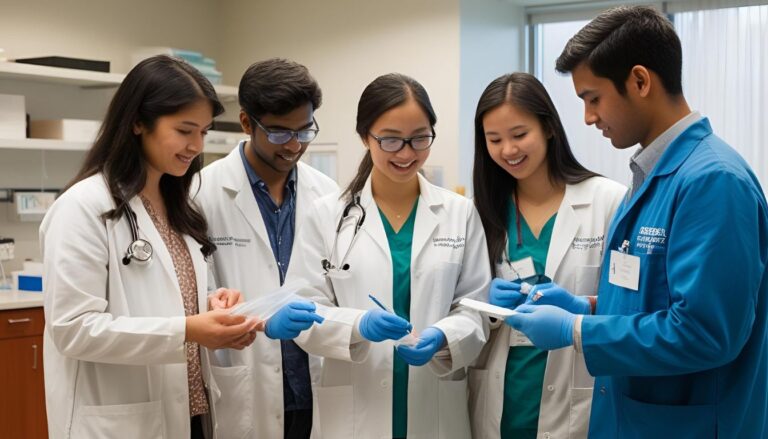Have you ever wondered why some medical graduates struggle to practice in India after studying abroad? The answer lies in a crucial document that bridges the gap between foreign education and Indian medical standards.
The National Medical Commission plays a vital role in ensuring that foreign medical degrees meet Indian criteria. For MBBS graduates from countries like Bangladesh, this verification is essential to secure the right to practice in India.
This document not only confirms the validity of your degree but also aligns it with Indian MBBS standards. Without it, registering for the Foreign Medical Graduates Examination (FMGE) becomes impossible, blocking your path to medical licensure.
Understanding the process and deadlines is key. Let’s explore how you can navigate this critical step and achieve your goal of practicing medicine in India.
Understanding the NMC Eligibility Certificate for Bangladesh MBBS Graduates
Navigating the path to medical practice in India after studying abroad can be complex. For graduates from foreign universities, certain steps are essential to ensure their degrees meet Indian standards. One such step is obtaining a mandatory document that verifies their qualifications.
Why This Document Is Mandatory
This document is a legal requirement under the National Medical Commission’s 2018 Screening Test Regulations. It confirms that a foreign medical degree aligns with Indian standards. Without it, candidates cannot register for the Foreign Medical Graduates Examination (FMGE), which is necessary for medical licensure in India.
For Indian citizens and Overseas Citizens of India (OCIs) who completed their MBBS abroad after March 2002, this document is compulsory. However, exemptions exist for degrees from countries like the USA, UK, Canada, Australia, and New Zealand, provided the candidate holds postgraduate qualifications.
Who Needs to Apply?
Most candidates who studied abroad must apply for this document. However, recent applicants who took the NEET-UG exam after 2018 may not need to, as their NEET scores serve as automatic verification. Here’s a quick guide to determine if you need to apply:
- Indian citizens or OCIs who completed MBBS abroad after March 2002.
- Candidates without postgraduate qualifications from exempt countries.
- Those who did not take the NEET-UG exam after 2018.
Non-compliance can lead to serious consequences, including being barred from the FMGE and medical registration in India. Understanding these requirements is crucial for a smooth transition into the Indian medical field.
Eligibility Criteria for the NMC Certificate
Securing the right to practice medicine in India after studying abroad involves meeting specific academic and legal standards. For MBBS graduates, understanding these criteria is the first step toward a successful application.
Academic prerequisites include a minimum of 50% in 12th-grade PCB for general candidates and 40% for SC/ST/OBC candidates. NEET scores are also mandatory, with a validity period of three years. Additionally, your degree must be recognized by the medical council of the country where you studied.
Documentation plays a crucial role in the process. You’ll need a valid passport, proof of internship completion, and authenticated mark sheets. Ensure all documents are attested by the concerned agency in your home country to avoid delays.
Common pitfalls include mismatched names on passports and expired NEET scores. Double-check all details before submission to prevent rejection. Here’s a checklist of essential documents:
- 12th-grade mark sheet with the required percentage.
- Valid NEET scorecard.
- MBBS degree certificate.
- Internship completion proof.
- Passport copy.
- Attested mark sheets from your home country’s medical council.
- Application form with accurate details.
Special cases like gap years, transfer students, and dual citizenship require additional documentation. For instance, candidates with a gap year after Class 12 must provide a valid reason and supporting proof. Transfer students need transcripts from both institutions.
By meeting these criteria and preparing the necessary documents, you can ensure a smooth application process. Stay organized and attentive to details to avoid common mistakes.
Step-by-Step Process to Apply for the NMC Eligibility Certificate
Applying for the right to practice medicine in India involves a clear, step-by-step process. This guide will walk you through each stage, from registration to final submission, ensuring a smooth experience.
Registering on the NMC Portal
Start by visiting the official website and creating an account. Fill in your personal and contact details accurately to generate an application number. This step is crucial for tracking your progress.
Ensure you have a valid email address and phone number for updates. Once registered, you’ll gain access to your dashboard, where you can manage your application.
Document Submission and Verification
Next, upload the required documents in the specified formats. These include your passport, degree certificates, mark sheets, and internship proof. Ensure all scans meet the DPI requirements and are in JPG/JPEG format.
If any documents are in a language other than English, provide certified translations. Double-check all details to avoid rejection due to discrepancies.
| Document | Format | Notes |
|---|---|---|
| Passport | PDF/JPG | Ensure clarity and legibility |
| Degree Certificate | PDF/JPG | Must be attested |
| Mark Sheets | PDF/JPG | All semesters required |
| Internship Proof | PDF/JPG | Include start and end dates |
Payment and Final Submission
Once your documents are uploaded, proceed to the payment section. The application fee is ₹3,000, payable via digital methods like credit/debit cards, net banking, or UPI. After payment, review all details carefully before submitting your application.
Keep your tracking number handy to monitor the status of your application. If any deficiencies are notified, address them promptly to avoid delays. For more details on document requirements, visit this guide.
Pro Tip: Submit your application during off-peak hours to avoid server crashes. Set up email alerts to stay informed about updates and deadlines.
Conclusion
Achieving your dream of practicing medicine in India requires careful planning and timely action. The process typically takes 6-8 weeks post-submission, so ensure all documents are accurate to avoid delays. Once approved, register for the FMGE and apply to your state medical council.
Remember, deadlines are critical. Submit your application before April 9, 2025, and stay updated on FMGE registration and exam dates. Avoid third-party agents offering “fast-track” services; they often lead to complications.
For official assistance, contact eligibility.regn@nmc.org.in or use the grievance portal. Follow this roadmap: from completing your MBBS abroad to practicing in India in five clear steps. Keep your final checklist ready, including your certificate, FMGE admit card, and state registration requirements.





